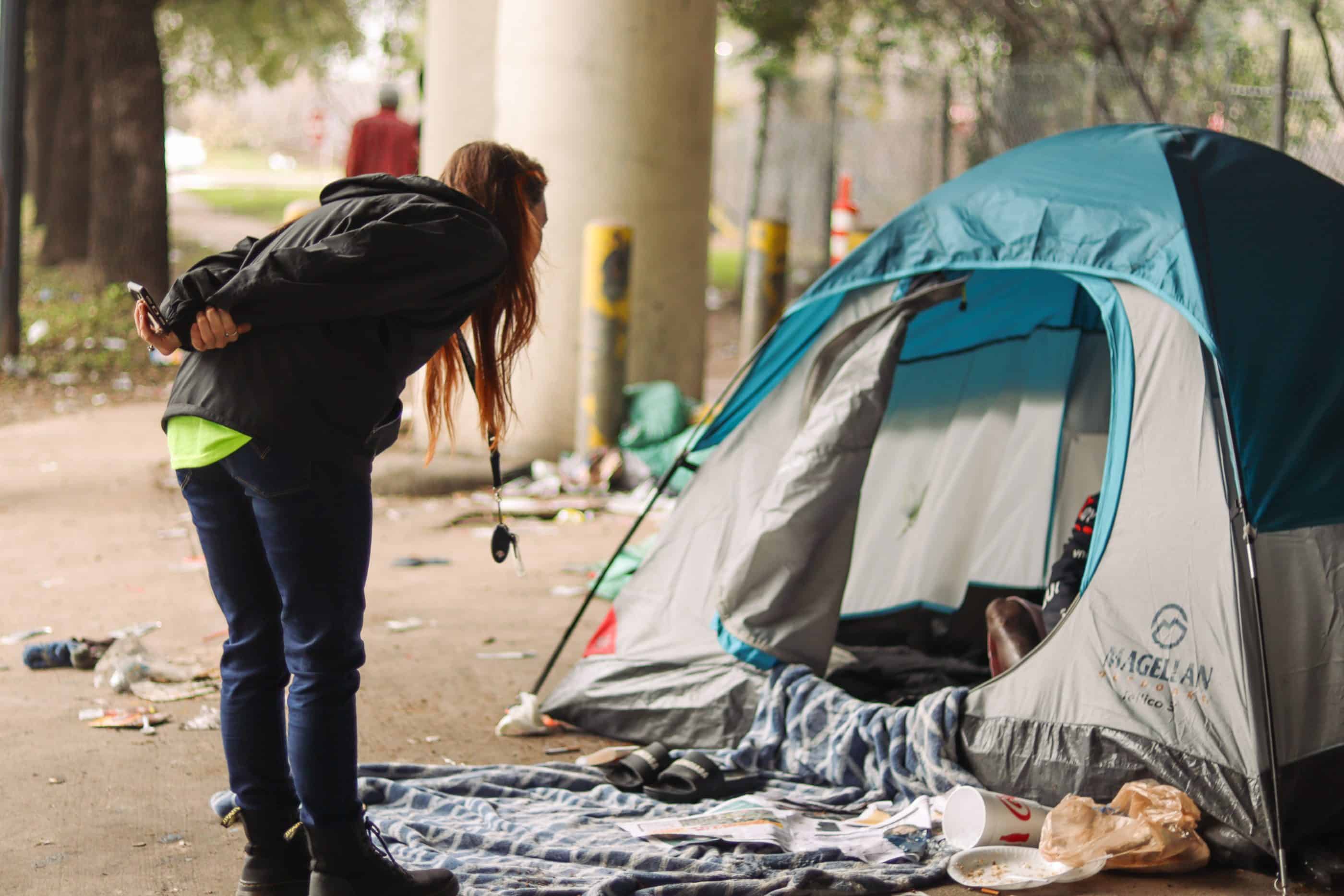Recent grant and staff cuts to the Department of Housing and Urban Development have threatened to hobble the nation’s public housing, affordable housing, and fair housing, and its homelessness response system, as Shelterforce/Next City reported in a series of articles from February through April.
But in just a few weeks, many of these drastic grant cuts—announced at a breakneck pace by the so-called Department of Government Efficiency, or DOGE—have either been walked back by the administration or temporarily restored while legal challenges work their way through the courts.
Delayed homelessness funds have begun to flow but with legally dubious new contract terms that may spark further litigation. And some grant cuts for capacity building and technical assistance were reversed with little explanation for why they were canceled in the first place.
The chaotic smorgasbord of results reflects the Trump administration’s incoherent approach and the lack of expertise within DOGE.
But it is also a sign that large organizations with legal teams and clout can be fairly successful at getting the Trump administration to back down, even as smaller organizations face ongoing uncertainty and looming threats of insolvency.
The Future of Fair Housing
As Shelterforce/Next City reported in March, HUD cut more than half of all Fair Housing Initiative Program (FHIP) contracts across the country in February. These cancellations effectively gutted the 1968 Fair Housing Act through administrative fiat, as the law relies on nonprofits as its primary enforcers. FHIP awards were codified in 1992 by Congress for nonprofits to test and investigate fair housing complaints, as well as to filter out meritless cases, before forwarding them to HUD.
Hollowing out the Fair Housing Act is in line with the overall anti-civil rights strategy of the Trump administration, which on April 23 signaled its desire to weaken the Civil Rights Act by attacking “disparate impact” as a metric to prove racial discrimination.
“These organizations are on the front lines fighting housing discrimination through enforcement of the Fair Housing Act,” Nikitra Bailey, executive vice president at the National Fair Housing Alliance, tells Shelterforce/Next City. “Without local advocacy, victims of discrimination will have no recourse.”
The Trump administration canceled grants for including language around racial diversity that had been explicitly required under the Biden administration, Bailey says; what’s more, she says, DOGE appeared to have canceled some grants based entirely on a word search for certain keywords, regardless of the context.
On March 13, the National Fair Housing Alliance and four fair housing organizations sued HUD and DOGE to restore cut FHIP funds, arguing that DOGE had acted beyond its authority and that HUD was violating the Administrative Procedure Act. The lawsuit represented a class of 66 fair housing organizations that had seen funding cut.
On March 26, a Massachusetts District Court judge issued a temporary restraining order that required HUD to restore the grants. It also restricted HUD from cutting any FHIP grants for 14 days which was briefly extended.
According to the National Fair Housing Alliance, all of the nonprofits whose funding was cut had it reinstated after this restraining order went into effect.
Two of these organizations, HOME Cincy and Southwest Fair Housing Council, confirmed to Shelterforce/Next City that their funding was restored following the ruling and that they have been able to continue their work.
Yet the future of fair housing funding is far from certain. The temporary restraining order was dissolved on April 14.
That decision came after HUD cited an early April Supreme Court decision around grant cancellations at the Department of Education; the court said those cancellations should be litigated in federal claims court, rather than district court. HUD seized on this, arguing it established precedent. Judges in the First Circuit agreed, and the restraining order was dissolved.
That means HUD can technically cancel fair housing grants again, though as of this writing it has not done so, according to National Fair Housing Alliance. Lawyers at Relman Colfax, which is representing the fair housing organizations, filed an appeal on April 22.
They argue that the restraining order should be restored because the fair housing groups have a strong chance of success in their lawsuit and because many of the organizations “would be forced to close entirely” without the grant funding, a marked distinction from the Supreme Court’s Department of Education decision, where the justices said that grant recipients “have the financial wherewithal to keep their programs running.”
In the appeal, the lawyers wrote that HUD cancelled FHIP awards on Feb. 27 “through a boilerplate letter that pointed to an inapplicable executive order and briefly parroted a federal regulation.”
The lawyers also pointed out that the grants do not promote preferential treatment for any racial group, as the Trump administration has argued.
Even if fair housing organizations are successful in permanently reinstating awards and barring HUD from canceling them again, there’s another problem on the horizon: The Trump administration has shifted the way that notices of funding opportunity are made public, creating a centralized review process that will go through DOGE.
In April, the Washington Post reported that DOGE canceled federal officials’ access to post grant opportunities to Grants.gov, where most federal funding opportunities are hosted. DOGE now has access to the website and will be posting grants itself after reviewing them beforehand.
David Levy, programs specialist at Fair Housing Council of Orange County, California, said that organizations are concerned they will be shut out of the competitive bidding process, even if they have a proven track record of enforcing the Fair Housing Act.
A notice of funding award for FHIP grants appropriated in fiscal year 2024 has yet to be announced; award notices typically go out each April.
Levy says FHIP funding applications for the awards that were meant to be announced in April “are not being processed, and it is quite plausible that they will never be processed. HUD is not sharing any information on this issue.”
“Congress is now being ‘second guessed’ by the administration on the basis of the administration’s ideological viewpoint,” Levy says.
Section 4 and Technical Assistance Grants
The most puzzling of HUD’s grant cancellations were for tens of millions of dollars in Section 4 contracts, which go toward capacity building and technical assistance for organizations building affordable housing.
Three organizations are explicitly mentioned as the only eligible recipients in the law establishing these funds: Enterprise Community Partners, Local Initiatives Support Corporation (LISC) and Habitat for Humanity. Yet both LISC and Enterprise were told that their Section 4 grants had been canceled in February, despite the statute.
After Enterprise and LISC appealed HUD’s decision, HUD reversed the cuts for both organizations in early April. Enterprise also saw the restoration of $10 million in Community Compass technical assistance grants, which provide know-how, legal expertise, and administrative support to organizations addressing housing and homelessness. Enterprise was one of eight organizations that saw these grants canceled in February.
Climate Funding
In March, Shelterforce covered the administration’s announcement that it would cancel $20 billion of Greenhouse Gas Reduction Fund grants awarded during the Biden administration. The funding is dedicated for maintenance and new construction of affordable housing stock, among other needs. A judge later blocked the EPA from reclaiming climate grants deposited in Citibank, according to Politico. But it did not allow the three nonprofits that were set to receive those grants to withdraw the funds, either. On April 15, a judge ordered Citibank to make the funds available to the nonprofits, but the EPA appealed and the funding was frozen once again. The case is ongoing; an appeals hearing is scheduled for May 19. According to Brooke Durham, a spokesperson for grantee Climate United, projects have been stalled and grantees have laid off staff and reduced salaries. “There are big concerns around our ability to operate in the future if we don’t get some kind of financial relief soon,” Durham said in an email.
Continuum of Care
Shelterforce/Next City reported in February and March on delays in distributing federal homelessness grant award letters, which had led one permanent supportive housing provider we spoke to, Family Tree, to alert its formerly homeless tenants that the organization would no longer be paying their rent. Those grantees have begun receiving their award letters—including Family Tree, which says it will continue to pay rent on its supportive housing units.
A spokesperson for the National Alliance to End Homelessness (NAEH) wrote in an email that, “While grantees are glad to see their grant agreements, there are new provisions added to the FY2024 grant agreements that are creating confusion and concern.”
Shelterforce/Next City viewed a copy of the new boilerplate grant agreement that grantees have been receiving. It says grants must comply with all executive orders and explicitly says that grantees should not use funds to “promote ‘gender ideology’” referencing an anti-trans executive order by the Trump administration that defines gender exclusively as sex assigned at birth.
“How and to what extent they change requirements or create new legal requirements for grantees is not entirely clear,” the NAEH told Shelterforce/Next City in a statement, adding that grantees should seek legal counsel.
The new requirements also say that the funds must be used in line with immigration restrictions, and that the money cannot be used in a way that facilitates or promotes “illegal immigration.” It also includes a requirement that any example of waste, fraud or abuse be reported to the HUD Office of Inspector General along with a phone number.
Eight jurisdictions—including King County in Washington, New York City, San Francisco, Boston, and Columbus—filed a lawsuit against HUD and the Federal Transit Administration in district court alleging that new requirements appended to Continuum of Care and public transit grants are illegal, HousingWire reports.
With so many recipients of federal housing grants affected by the Trump administration’s cuts and funding freezes, more points of legal confrontation are inevitable.





Comments